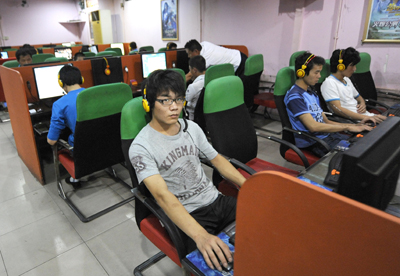China’s latest media regulations, issued Thursday in a bid to take some steam out of microblogs that increasingly drive the country’s news agenda, signal an increased role for the state in drafting and enforcing press standards.
The General Administration of Press and Publication (GAPP), which licenses all domestic newspapers, magazines, and reporters, gave a clear indication that its new rules are aimed at controlling the growing influence of social media, especially the popular domestic Twitter-like services which have drawn hundreds of millions of users:
“Regarding information that is received by phone, mail, microblog, blog, and other channels of transmission, if the information has news value, a news organization must, prior to publication, dispatch its own reporters and editors to conduct verification before it can be used.”
This and many of the other regulations appear to simply reiterate journalistic best practices: Reporters are required to be objective and report all sides of a story. They are prohibited from aggregating reports or relying on second-hand accounts that have not been independently verified, in particular information obtained from online sources, outside contributors, or by phone. News organizations must set up systems to guard against the publication of false reports and strengthen responsibility at all levels and through every stage of the editorial process, including the establishment of procedures to investigate errors and publish corrections and apologies.
Some Chinese news organizations already have stringent reporting standards; others don’t. Either way, the problem lies with the government rather than reporters and editors setting the standards and determining who or what complies with them.
For example, the rules state that journalists should rely on in-person interviews, “authoritative sources of information,” and verifiable facts in their reporting. Critical news reports must be based on information from at least two different sources, and journalists must retain evidence of the information that has been received and verified. (Regulators already had the authority to ask for source material, but most savvy journalists would discard anything sensitive). The use of anonymous sources is discouraged, with limited exceptions for “national security, privacy or other special reasons,” and reporters are cautioned against describing anonymous sources with phrases such as “a person familiar with the matter,” “a person involved in the matter,” or “an authoritative person.” Likewise, the use of pen names is barred, and reporters and editors involved in a story must sign their real names to it. (Pen names have been popular with opinion writers as well as in official media like People’s Daily and Global Times.)
Crucially, the rules also reiterate that reporters must be licensed by and warns news organizations against hiring reporters on a temporary basis — signaling a potential crackdown on the widespread practice at many news organizations of using unlicensed reporters, freelancers and temps.
The rules state that violations may be punished by a range of penalties, including the suspension of a journalist’s license, the closure of news organizations, and criminal liability where applicable. But it’s unclear whether the rules will be tightly implemented or if news organizations will be able to get away with the bare minimum of compliance.
The new rules come amid a much broader campaign against the spread of what Beijing characterizes as rumors and false reports, launched since China’s microblogs took the lead in reporting a major train crash in Wenzhou in July. This month, top executives of China’s major Internet and technology companies convened at a three-day seminar in Beijing where they pledged to crack down on the spread of false information, and in October several people were reported arrested or detained for allegedly publishing false information on Chinese microblogs.
